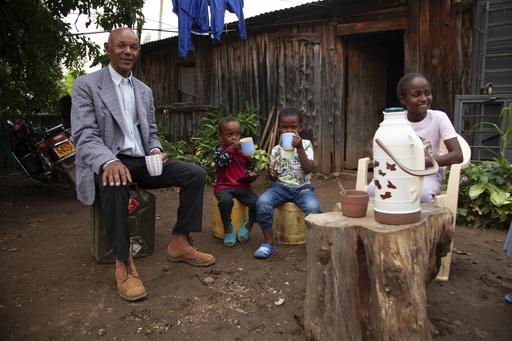
“`html
NANYUKI, Kenya — Margaret Wandia found herself pregnant after a brief encounter with a British soldier who was stationed for training near her home in Kenya. Their relationship, which lasted about a week, occurred while she was employed at a bar in her early twenties, and afterward, he left her with a biracial child. Now, her son is 26 years old and is among a group of children seeking to confront authorities in the UK regarding similar cases that have emerged over the years.
This endeavor is led by a Kenyan lawyer aiming to highlight the struggles faced by these children and to identify their fathers, hoping to obtain their assistance. However, this initiative is considered challenging, as various human rights organizations have spent years trying to hold the British military accountable for allegations linked to their training in Kenya, which include claims of sexual misconduct.
The defense cooperation agreement between Kenya and the UK, valued at $44 million, was renewed in 2021. It facilitates the training of up to 10,000 British troops in Kenya for a duration of eight weeks each year. The existence of biracial children in Kenya raises significant concerns about the conduct of British soldiers, particularly regarding the ongoing allegations of sexual assault against local women.
Louise Gitonga, Wandia’s son, has expressed feelings of alienation due to his mixed heritage, particularly in a predominantly conservative society. He explained that being perceived as “too white” has hindered his access to education and job opportunities. “I face an identity crisis that has led to struggles with alcoholism,” he shared from his residence in Nanyuki. “People often label me as a white man or an albino, which causes me considerable distress.”
Margaret recounted her experiences of sending Louise to boarding school, where she was charged higher fees for her child because of his lighter skin. Afterward, she married a local farmer, Paul Wachira, who acknowledged the difficulties of parenting a biracial child. “I occasionally had to shield him from relatives during gatherings to avoid uncomfortable questions about his appearance compared to his siblings,” Wakira noted.
Kelvin Kubai, a Kenyan lawyer, is advocating for 10 children of British forces, asserting that many of their origins were not consensual. He has plans to partner with a British law firm to take these issues to court next year, aiming to clarify their identities. “These children often have no understanding of the circumstances they were brought into the world,” Kubai remarked. His goal includes securing citizenship for them, as UK regulations allow children born to British citizens to claim citizenship under specific conditions.
Currently, seven of the children he represents are under the age of 18. For those who are older, the objective is more about understanding their heritage and receiving support. In preparation, Kubai is raising funds, totaling $4,600 so far, to conduct DNA tests to trace the fathers of these children.
The identity struggles predominantly affect those with white fathers, while those with Black British fathers remain less visible in society, according to Kubai. He emphasized that such cases are less likely to experience the same discrimination.
A spokesperson from the British High Commission stated that both the commission and the military training mission actively collaborate with local child protection authorities regarding paternity claims. However, mothers and advocacy groups in Kenya have criticized British authorities for providing minimal assistance.
Jenerica Namoru, a 29-year-old mother of a five-year-old with a British father from the training mission, shared her experience of initially receiving support from the man, who is named on their child’s birth certificate, but later withdrew from offering financial assistance. Despite her attempts to reach out to the British Army Training Unit Kenya for help, she faced obstacles. “They even prevented me from entering their premises at times,” she said, and is now also under Kubai’s representation.
Biracial children in areas surrounding the British training site trace back to the era of British colonial rule in Kenya. Some of those from decades past are part of ongoing efforts to demand justice and search for support. David Mwangi Macharia, 68, recalls being nicknamed “British” due to his lighter skin and how it affected his life. He struggles to find work and has faced stigma that limited his educational opportunities.
Calls for accountability regarding the British forces have been ongoing but have seen little progress, according to local opinions. Marion Mutugi, a commissioner from the Kenya National Commission on Human Rights, described the nature of relationships between British soldiers and local women as varying from consensual to coercive. The commission has reported over 200 rape cases linked to British troops between 1983 and 2003, continuing to compile evidence.
The UK defense ministry has reportedly dismissed these claims, while a 2007 investigation led by the Royal Military Police failed to grant justice or compensation to the victims. Mutugi highlighted that investigations are often compromised, citing threats affecting local human rights defenders.
Investigative efforts were rekindled by a recent public hearing initiated by Kenya’s parliamentary defense committee. Among the most publicized cases is that of Agnes Wanjiru, who was murdered in 2012 after being seen with British soldiers; a 2019 inquest recognized that she was killed by British soldiers, yet no charges have been made.
Kubai aims to facilitate a crucial conversation through UK courts not only about issues of sexual violence but also regarding the identities of children who are victims of circumstances beyond their control. “We focus on these children’s plight, who are bound by identities imposed on them at birth,” he stated.
“`

